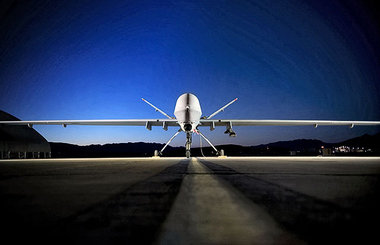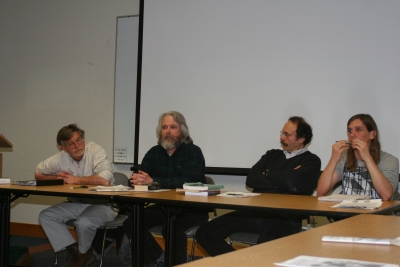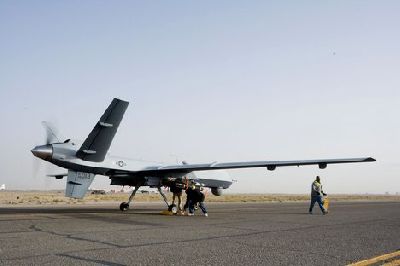RIT Panel Discusses Drone Weapons
Primary tabs

Rochester Institute of Technology hosted a panel discussion on March 31, 2011 attended by 40 people. The three panelists were Ed Kinane of the Syracuse Peace Council, Jack Bradigan-Spula, a local antiwar activist and musician, and Professor Vincent Serravallo, of Sociology at RIT. The topic of discussion was the drone weapons being used by the US in Afghanistan, Pakistan and elsewhere. Drones are remote-controlled small aircraft equipped with precision cameras and up to 3500 pounds of weaponry. Pentagon officials describe them as “Hunter-Killers†capable of seeking out and destroying individual buildings, vehicles or even people. They require no pilot or flight crew on board. They can be “flown†from literally the other side of the world. They can be easily transported to a battle field and launched by a small ground crew, often comprised of mercenary contractors. Drones are a concern to upstate New York and RIT in particular. They are being controlled from the Hancock Air Base in Syracuse. The Air Force wants to conduct test flights over the Adirondack park. Development is ongoing at RIT and other institutions to develop bigger, faster and deadlier drones. The drones in use now are propeller-powered but a faster jet version that can carry more weapons is under development. They require a human to actually “pull the trigger†on a target. Perhaps the most frightening of the planned new technology is a drone that can seek out and destroy a target without human intervention. This sounds familiar to fans of the Terminator movies, which did not end well for the humans. It is no longer science fiction.
The first speaker was Ed Kinane of the Syracuse Peace Council. He quoted Colonel Kevin Bradley of the Air National Guard as saying “this will save lives†to Senator Gillibrand. What he meant to say is that it would save American lives and even that claim is dubious. Kinane describes the drones as “gee-whiz weapons; tactically clever but strategically stupid.†He cited deaths from drone attacks in Pakistan. In 2007, one attack killed 20 people. In 2009 the last complete year statistics were available for, 46 attacks killed 536 people. Note these attacks are in Pakistan. But we aren't at war with Pakistan. This is an example of “mission drift.†“It further distances people from the war. We lose control of the violence.†Drone “pilots†in Syracuse have no knowledge of their victims or the legality of their actions. However the technology allows them to be investigator, prosecutor, judge, jury and executioner from halfway around the globe. The CIA has been employing drones to carry out assassinations of people only believed to be enemies. Often the victims are civilians.

Right now the US holds a monopoly on these drones but that will not last. Just as with nuclear weapons of the last century, others will develop or acquire them. Not all of these others may be our friends. Russia, China, Brazil, Israel and France all have development programs for similar weapons.
Israel has already used them against civilians in Gaza. Yet another danger is that these weapons could be used against civilians at home. They are already being used for surveillance along the Mexican and Canadian borders, supposedly to thwart illegal immigration and drugs. Attacks within Mexico have been reported. Could they be used to spy on, or even attack a popular uprising such as recently occurred in Wisconsin? Blowback is another danger the US faces from increasing use of these weapons. The man arrested for trying to detonate a bomb in Times Square cited drone attacks as reason for his action. A doctor turned suicide bomber blew up a contract crew in Pakistan charged with launching drones.
Jack Bradigan-Spula spoke next. He served in the US Marine Corps in Vietnam seeing firsthand what the US was really doing in Asia. Upon returning home he became a draft counselor and peace activist. His topic for discussion was Bravery vs Cowardice. The American people need to see themselves in honorable in the eyes of the world. But is a sneak attack honorable? Especially when it is carried out from around the world? Drone pilots can do their deeds and then go home and have dinner in safety with their families. America has become the master of the sneak attack, going back as far as General Wood's attack on the Philippines in 1906. Often a religion or deity is cited as justification for the attack. Is there really much difference in the honor of a drone operator versus a suicide bomber, other than the fact that the drone operator lives to kill again? We have seen examples of blowback from our sneak attacks when they have been used against us. Lebanon in 1982, and on September 11, 2001.
Professor Serravallo spoke last, on the systemic problems related to this technology. In an example of mission creep, the role of the US military has drifted from defending the United States of America to defending Global Capitalism. President Eisenhower warned us 50 years ago about the danger of the Military-Industrial Complex. This has now become a Military-Industrial-Academic Complex. Funding for higher education has dwindled, forcing institutions and professors to make up for the lost revenue by engaging in research for the Pentagon. The concept of Formal Rationality was explained. Formal Rationality is a calculating approach to getting a task done without regard to the consequences.
Robotic warfare and torture can be justified under this model. Tasks are “compartmentalized†such that no one person can take responsibility for the end result. A cartoon was handed out showing a researcher who said “I just mix chemicals†a truck driver saying “I just deliver goods†a pilot saying “I just fly a plane†and a technician at a computer terminal saying “I just push a button.â€

In one of the most blatant examples of what has become known as “Greenwashing†much of this research is being conducted at RIT's Institute for Sustainability. Professor Serravallo defined Sustainability as an active orientation of humans toward their environment. “These things turn that definition on its head.†He likened it to “developing sustainable tobacco for organic cigarettes.â€
The US and global corporations are working to impose an economic model of Formal Rationality known to most of the world as Neoliberalism. It puts the worker, researcher and citizen out of the equation. It eliminates the pilot, gunner and flight crew. Training may even be “outsourced†to consumer video games. It employs a type of Military Keynesianism using military procurement to stimulate the economy.
If there is one positive aspect to be taken from Neoliberalism, it is that students are now seen as “consumers†of education. In business, the customer is always right. Unsatisfied customers get results.









